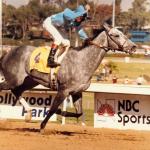
HRWA to Kick Off Three-Part Leadership Series Led by Amy Brin Jan. 29

If you’re new to horse racing, you’ll notice very soon that horses will be assigned different jockeys to ride them often during their careers on the track. Rarely will a horse have the same jockey in the saddle from their first start through their last. There are countless reasons for this, but the core principle is simple: horse owners are small businesspeople, most of them with a chief executive mindset, and jockeys in North America are independent contractors in charge of making their own employment decisions.

This allows for a great amount of freedom for both owners and jockeys in the day-to-day business of horse racing, but also a degree of risk, making building personal relationships in the industry very important. Becoming a successful jockey requires talent and hard work, of course, but also a commitment to self-promotion. That’s why most jockeys, especially the top ones, focus on honing their riding skills and hire agents to represent them and secure assignments (or mounts) for them.
The agent usually receives 20 or 25% of a jockey’s earnings, which come from mount fees paid every time a jockey rides in a race and more importantly, from purse earnings after a good finish (a standard 10% of the winning horse’s purse goes to the jockey). For his or her commission, the agent does just what agents representing actors, artists, novelists, or other uniquely talented independent contractors do – drum up business, 24-7, 365. The best jockeys in North America earn millions per year, but even they are not exempt from being replaced on a horse by an owner’s decision, a trainer’s preference, or a combination of both.
When you see a new jockey named to ride to a horse, it could be because:
1. Injury: Unfortunately, accidents occur on the racetrack, and even though protective gear has become much better over the past decades, nearly every jockey will have to miss time to recover from injuries at some point in their career. If a jockey is recovering when a horse they’re assigned to ride has a planned start coming up, the owner and trainer will need to find a substitute. This happened on the 2025 Kentucky Derby trail, in fact, when Junior Alvarado, who had ridden top Derby contender Sovereignty in all four of his career races, suffered a shoulder injury in late March and had to miss several weeks. Owner Godolphin and trainer Bill Mott named Manny Franco to ride Sovereignty in the Curlin Florida Derby.
2. Change in track or circuit: Many of the best horses travel around to different tracks or even different parts of the country to compete. When this happens, it’s not uncommon for owners/trainers to pick one of their favorite jockeys from the new destination track or region to take the mount. Although for the biggest stakes races, if an owner/trainer has an established relationship with a particular jockey and they’ve already had success riding the horse, the jockey usually will make the trip, too.

3. Change in racing strategy: Horses and jockeys are individual athletes with their strengths and weaknesses, and often an owner and trainer will seek out a rider whose skills they think will work best with their horse. However, if after a few races they feel the need to try a different approach during a race – positioning the horse closer to the lead rather than the back of the pack, or trying a horse on a new surface, for example – they have the right to choose a different jockey whom they believe will help their charge make the transition.
4. Seeking more experience: This makes things difficult for young jockeys trying to reach the upper echelon of their profession. When jockeys begin riding, they are classified as apprentices and are given a weight allowance when riding, meaning that their horse does not have to carry weight equal to others in the race ridden by veteran jockeys. However, this weight allowance is not granted in stakes races, and apprentices rarely compete in them. When young riders move into the journeyman ranks and lose their weight allowance after a specified number of starts, they’re still very early in their careers. So you’ll often see owners and trainers switch to a jockey who has competed in the sport’s biggest races if their horse proves to be good enough to reach that level. It happens every year around this time, it seems: a young jockey that has ridden a Kentucky Derby contender early in its career loses the mount before the first Saturday in May to a rider with a fuller résumé.
5. The disappointing outcome: When a horse does not perform up to expectations in a race, it’s the prerogative of the owner and trainer to determine why, and unfortunately for jockeys, many times they’re singled out for the blame. Did they wait too long to rally their horse and find no running room in the stretch? Did they angle their horse out when they should have angled in? Everyone has an opinion, but in horse racing those belonging to the owners and trainers are the ones that hold force.
Unlike in professional sports leagues, there is no union for North American jockeys, although the Jockeys’ Guild has been advocating for improved safety and work conditions and helping riders in myriad other ways (such helping with high healthcare costs) since 1940.
So in an environment where every jockey (and agent) is competing for mounts, peaks and valleys in workload and income are to be expected - it’s the nature of the sport. But those who’ve chosen to make this very difficult profession their life’s work will say the highs experienced before, during, and after a win on the track make it all worthwhile.